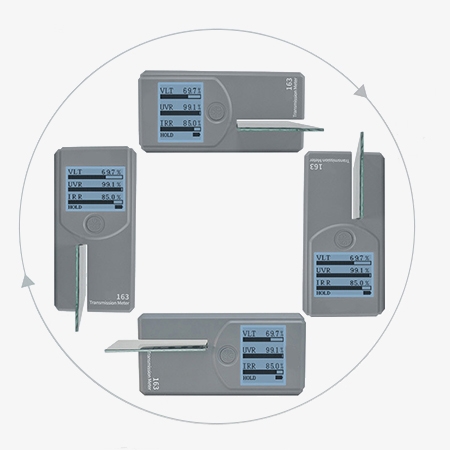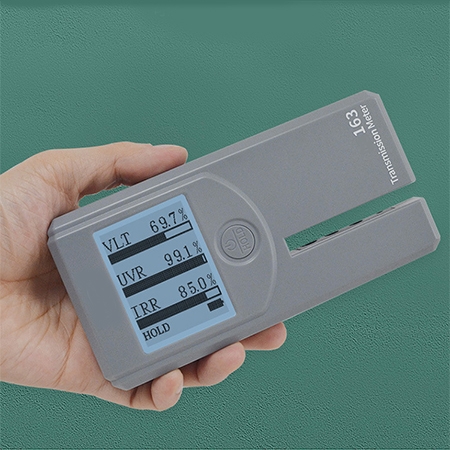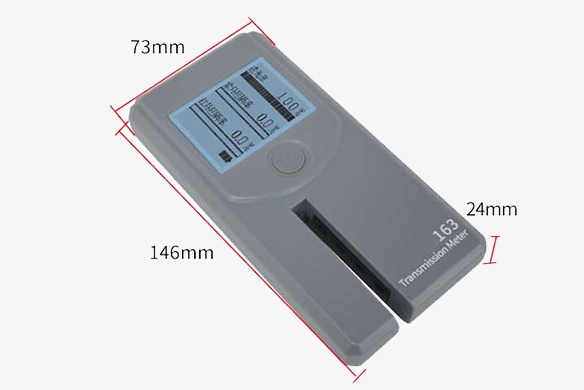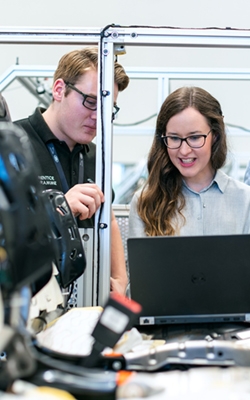SISCO tint meter boasts a parallel light path design, with a test slot width of 6mm, which is an instrument for measuring the optical properties of uniform and transparent materials such as solar film, glass with film, heat-insulating glass, and automobile side windshield glass.

Rotatable large LCD screen
- With a large rotatable LCD screen, users can adjust the screen angle according to measurement needs and easily view readings from multiple directions. This design is particularly suitable for operation on glass surfaces at different heights or angles, such as car windows or architectural glass.
- The screen can follow the test direction and automatically rotate up, down, left, and right to read the reading, making reading more convenient.
- The large rotatable LCD screen not only enhances the flexibility of the equipment but also greatly improves the measurement efficiency and user experience.

Small size, easy to carry
- Small size, lightweight, can be used for on-site measurement anytime and anywhere, and can measure materials with a thickness of up to 6mm.
- The small and lightweight design makes the window tint meter highly portable, allowing users to carry it effortlessly in toolkits, bags, or even pockets. This ensures convenience during on-site inspections or fieldwork.
- The compact size takes up minimal storage space, making it ideal for professionals who need to travel frequently or work in environments with limited space.
- Its portability enables quick and hassle-free measurements in various locations, from automotive workshops to construction sites, without being burdened by bulky equipment.
Dimension

Applications
SISCO tint meter is used to measure the visible light transmission (VLT) of glass or window films, ensuring compliance with regulations and assessing performance. It is widely applied in the automotive industry for verifying car window tinting, law enforcement for roadside inspections, construction to evaluate building window films, industrial quality control for testing optical materials, and the solar energy industry to assess the effectiveness of tinted or coated glass panels in blocking UV and infrared radiation while optimizing visible light transmission. Its portability and precision make it an essential tool across various sectors.

Construction

Industrial Quality Control

Solar Energy Industry

Automotive Industry
| Model | SISCO-TM-163 |
| UV Peak Wavelength | 365 nm |
| IR Peak Wavelength | 940 nm |
| Visible Light | 380-760 nm, conform to the CIE photopic luminosity function |
| Accuracy | ±2% (Colorless and transparent material) |
| Resolution | 0.1% |
| Test Slot | 6mm*58mm (W*D) |
| Display | 128*128 Dot matrix LCD |
| Dimension | 146mm*73mm*24mm (L*W*H) |
| Weight | 187g |
Q1: What is a tint meter?
A1: A tint meter is a device used to measure the Visible Light Transmission (VLT) of glass or window films. It determines the percentage of light that passes through a window, helping to assess whether the tint meets legal or industry standards. Tint meters are commonly used in the automotive industry to ensure compliance with regulations on window tinting, in law enforcement for roadside checks, in construction for evaluating window films, and in industrial quality control for testing tinted materials. These devices are portable, easy to use, and provide precise readings for various applications.
Q2: Can I use a tint meter on all types of glass?
A2: Yes, a Tint Meter can generally be used on most types of glass, including:
- Automotive windows: To measure the tint level of car windows.
- Architectural glass: To assess tinted or coated glass used in buildings.
- Glass with films or coatings: Tint meters can measure the combined transparency of the glass and any applied films, such as UV or reflective coatings.
However, for accurate readings, the glass surface should be clean and free from obstructions, and the meter should be properly calibrated. Some specialized tint meters can also work with laminated or double-glazed windows, but it's essential to check the device’s specifications for compatibility with specific glass types.
Q3: Are tint meters legal to own?
A3: Yes, tint meters are legal to own in most countries. They are commonly used by professionals, law enforcement, and businesses to measure Visible Light Transmission (VLT) of glass and window films. While owning a tint meter is generally legal, its use may be regulated based on local laws, especially for checking compliance with window tinting regulations. Always check local laws to ensure proper use.
Tips: Can I use a window tint meter to measure glass with a protective film installed?
Yes, a window tint meter can measure glass with a protective film installed, as long as the film is transparent enough for light to pass through. The meter will assess the combined visible light transmission (VLT) of the glass and the protective film, providing an accurate reading of how much light penetrates both layers.
Key Points to Consider:
Compatibility with Layers: Most tint meters are designed to measure single or multi-layered materials, including glass combined with protective films or tints.
Impact of Film Properties: The type and thickness of the protective film can influence the measurement. Heavily tinted, reflective, or UV-blocking films will reduce the VLT percentage more than lighter films.
Application Scenarios: This feature is particularly useful in automotive, residential, or commercial settings where protective or decorative films are commonly applied to glass.
Ensure Proper Contact: For the most accurate readings, ensure the meter is properly aligned and makes full contact with the surface of the glass and film.
Thank you for buying industrial test and measurement equipment on SISCO.com, all products sold by SISCO and the partner cover a 12 months warranty, effective from the date of receiving the products.
What is covered?
SISCO is responsible for providing free spare parts, and free technical support to assist the customer to repair the defective products until the problem is solved.
What is not covered?
- Product purchased from anyone other than a SISCO store or a SISCO authorized reseller.
- Expendable parts.
- Routine cleaning or normal cosmetic and mechanical wear.
- Damage from misuse, abuse or neglect.
- Damage from use of parts other than SISCO approved.
- Damage from use outside the product’s usage or storage parameters.
- Damage from use of parts not sold by SISCO.
- Damage from modification or incorporation into other products.
- Damage from repair or replacement of warranted parts by a service provider other than a SISCO authorized service provider.
- Damage caused by the application environment not meeting the product usage requirements and the failure to perform preventive maintenance.

